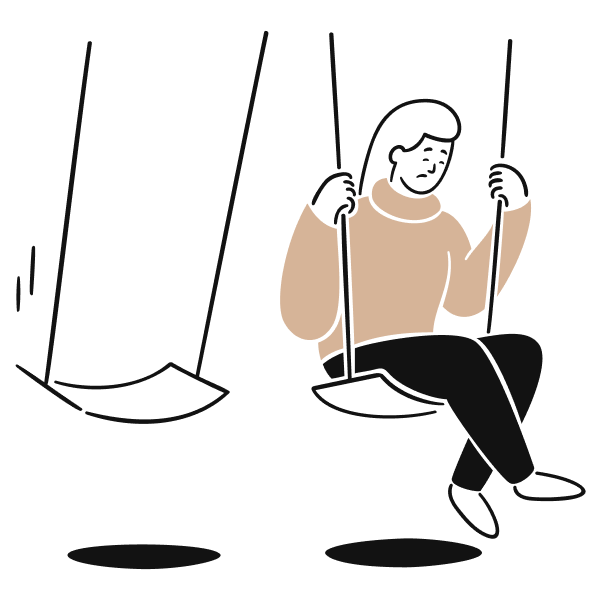How to cope with a depression?
If the complaints are not that great yet, you may not want to talk to a psychologist immediately. So what can you do yourself to better cope when feeling depressed?
We have listed 11 tips for you to help you take the first step. It may seem difficult to try new things if you suffer from depression. By visiting this page, howevre, you have actually already taken the first step. By discovering what you can do yourself, you are already moving in the right direction.
11 tips to cope with a depression
1. Upgrade your diet
It’s essential for your body that you’re getting all the right vitamins, minerals, and nutrients. Your body still needs fuel, even when you’re depressed, and bear in mind that depression has been linked to vitamin and mineral deficiencies. Provide 3 healthy meals a day with breakfast, lunch and dinner. And is that going a little too fast for you? Apply the Eetwissel (https://www.voedingscentrum.nl/nl/thema/eetwissel.aspx) of the Voedingscentrum, so you can eat healthier in small steps.
2. Exercise regularly
It is wonderful to move, even if it may be difficult to imagine now. Take a walk, cycle, swim or do yoga. It doesn’t matter what kind of exercise you do, as long as you get off the couch every day. You don’t have to work out really intensely, it’s just about staying active. Once you’re moving and exercising, your body will start producing hormones that make you feel happy.
3. An activity every day
Despite your sadness or depression, try to do an activity or see people every day. Meet with someone or go out to do something yourself when you feel depressed. Schedule (social) activities, such as hiking or doing household chores.
4. Talk about your feelings
It may be especially difficult the first time, but talk about your feelings. Talk to your partner, your family or friends about your current situation.
Tip: do you find it difficult to discuss this with friends or family? Or are you not sure who to talk to at all? At OpenUp (https://www.openup.care) you can do this anonymously and without obligation.
5. Write down your thoughts and feelings in a mood diary
Buy a nice diary and write down every day how you feel and what you think about. You don’t have to write long stories, although you probably will find that it gets easier for you along the way.
6. Apply structure to your day
Try to structure your day as much as possible. Go to bed at a fixed time and get up at a fixed time. Preferably do this during the week and at the weekend, such that you give your body the chance to get used to it. Try not to lie in bed for too long and instead get up as soon as your alarm clock goes off. Make sure not to skip meals or oversleep and try to eat your meals at the same times each day.
7. Do breathing exercises
Do you notice that you are restless? Occasionally doing a breathing or relaxation exercise can help. They bring more rest in your body and in your thoughts, such that you can better organize them.
8. Reduce or stop intake of alcohol and drugs
Consuming these substances can intensify your depression. They’ll briefly numb everything, but they’ll soon start to adversely affect your stress hormones, actually amplifying any feelings of sadness and apathy. You also run the risk of falling into a vicious cycle where you use drink and drugs to try and forget your depression.
9. Do things you enjoy
Even if it’s just a little bit – you want to try and do things that normally make you happy. They don’t have to be particularly productive activities. The most important thing is that whatever you’re doing should make you feel good. For example, try making music, painting or doing something else creative with your hands. Maybe take up gardening, go cycling, or craft a wooden house for the hedgehog that lives in your garden.
10. Only baby steps
Don’t start with anything too unfeasible. You want to set small goals so that you won’t be disappointed if something doesn’t work out or you can’t stick with it.
11. Try Self-help programs
There are various online self-help programs for people with depression. The idea of these is that you’ll learn to improve and appreciate your quality of life again. There are also lots of books you can buy that are full of tips, as well as recognizable stories and situations, to help you get going. By actively confronting your depression for yourself, you can take back control of your life. However, this does require a certain degree of motivation.
.
Prefer talking to our psychologists?
Is it too difficult to cope with depression yourself? We would like to invite you to contact us. We would be happy to talk to you about what you experience and how we can help you.
-
Do you have questions about what a depression is and whether you are suffering from depression? Call us on +31202143928 so that we can give you personal advice.
-
At iPractice, we treat using blended care. This is a combination of online and offline therapy. You’ll have face-to-face conversations with a consulting psychologist and you’ll also have access to an online psychologist in between. This means that you can ask questions and share your thoughts whenever you like.
-
Cognitive behavioral therapy (CBT) and Acceptance and Commitment Therapy (ACT) are common treatments for a depression.


 Nederlands
Nederlands




